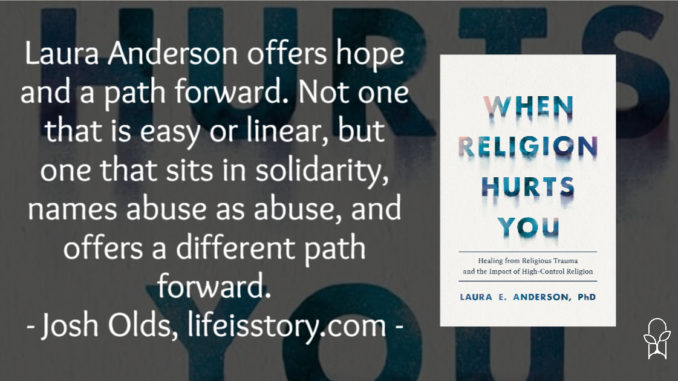
Published by Brazos Press on October 17, 2023
Genres: Non-Fiction, Christian Life
Buy on Amazon
Goodreads

"Anderson strikes a smart, balanced tone. . . . An exemplary guide to an understudied issue."--Publishers Weekly
Religious trauma is something that happens far more often than most people realize. But religious trauma is trauma.
In When Religion Hurts You , Dr. Laura Anderson takes an honest look at a side of religion that few like to talk about. Drawing from her own life and therapy practice, she helps readers understand what religious trauma is and isn't, and how high-control churches can be harmful and abusive, often resulting in trauma. She shows how elements of fundamentalist church life--such as fear of hell, purity culture, corporal punishment, and authoritarian leaders--can cause psychological, relational, physical, and spiritual damage.
As she explores the growing phenomenon of religious trauma, Dr. Anderson helps readers embark on a journey of living as healing individuals and finding a new foundation to stand on. Recognizing that healing is a lifelong rather than a linear process, she offers markers of healing for those coming out of painful religious experiences and hope for finding wholeness after religious trauma.
More and more, I’m seeing people who grew up in the church walk away from it. And I don’t mean those who attended occasionally or casually, but those who were all in, every service, knew the lyrics to Jesus Freak (even if that song was considered a bit too edgy) kind of people. For many of these people, when I hear their stories, I can’t say that I blame them. The church environment they were in was not healthy—and in fact led to serious and lasting religious trauma. There’s a meme I’ve seen going around recently that says something like “I think my anxiety started as a kid when I was taught that the Rapture could happen at any time.” It’s played for laughs, but it’s true. Religion can hurt. In When Religion Hurts You, Dr. Laura E. Anderson draws on her own experience and her work as a clinical therapist specializing in religious trauma to discuss the nature of religious trauma and how to begin to heal.
I think that the most valuable part of When Religion Hurts You is its function as a work of solidarity. Many who have been raised in high-control religious environments who escape that have a deep sense of loneliness and shame—coupled with a lack of knowledge of where to go after escaping. By sharing from her personal and professional experience, Dr. Anderson is able to say with clarity and finality that you are not alone.
When Religion Hurts You is derived from Anderson’s doctoral dissertation on the subject, but unlike most dissertations turned books Anderson is able to widen the scope, tone down the academia, and write a compelling and educative narrative that is both accessible and engaging. One of the ways Anderson does this is by beginning with her story, and then referencing it throughout the book. After this personal introduction, she weaves between a discussion of the science of trauma, the types of religious abuse that might cause that trauma, and how to begin to forge a new identity out of that trauma.
One of the most important parts of the book were the chapters on connecting with one’s body, both physically and emotionally. When Religion Hurts You explores harmful messages that may come out of high-control religion and what can be done to counteract those messages. This isn’t some easy-peasy superficial pop-psychology nonsense. It’s real, it’s deep, it’s clinically-backed, and it comes with the acknowledgement that the journey is going to be difficult.
Anderson also teaches readers that it is okay to grieve what they’ve lost—both by being raised within a high-control religion and by leaving it. That allowance to grieve, something often not allowed by high-control religious settings, helps readers define their abuse, see their areas of need, and identify specific areas where healing is needed.
When Religion Hurts You made me rage. It made me weep. It frustrated me to no end. Because this is a book that ought not to be needed. But it is so desperately needed. There is a generation of Sunday School stars who are in their twenties and thirties and forties and have no idea how to heal because they can’t quite define how they’ve been hurt. When Religion Hurts You gives language for that. It lovingly, empathetically points out the wounds and then begins the process of healing them. Laura Anderson offers hope and path forward. Not one that’s easy or linear, but one that sits in solidarity, that names the abuse as abuse, and offers a different path forward.
